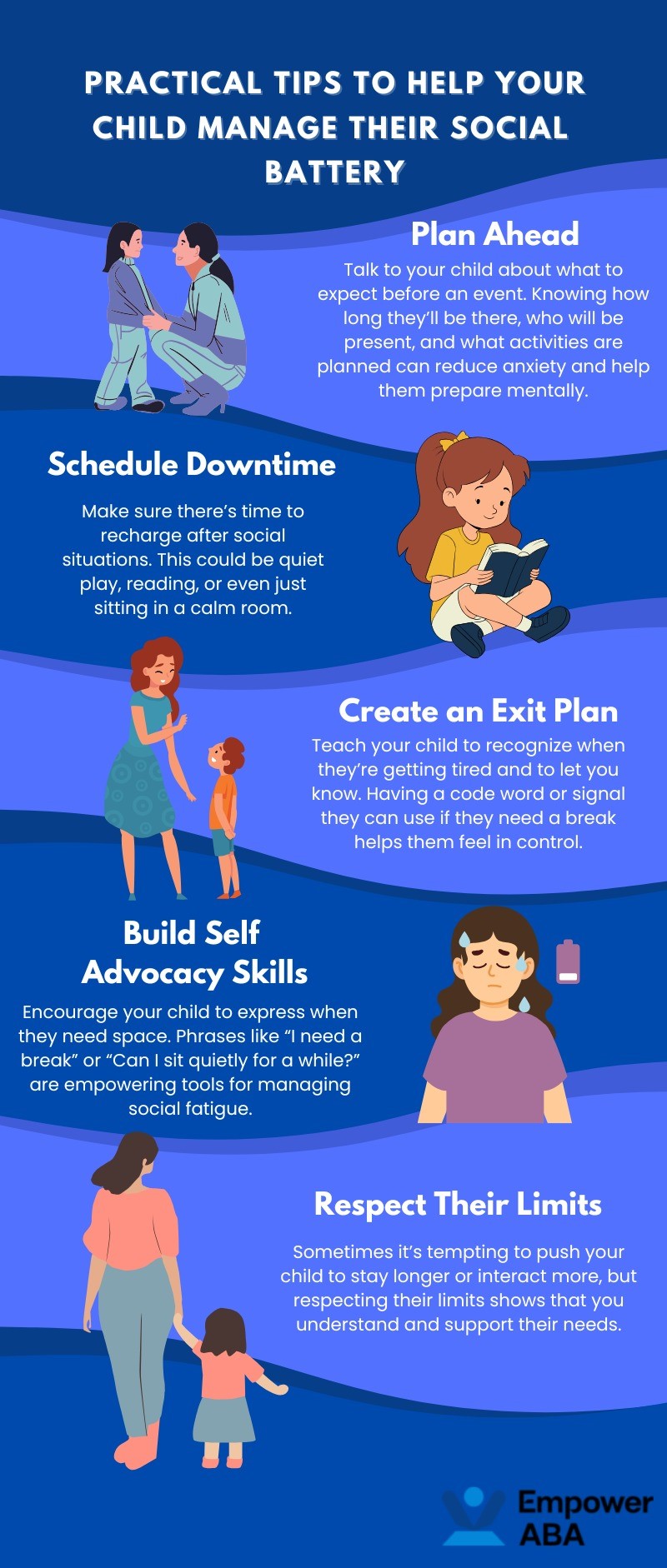Key Points:
- Autism can make social situations more draining, and understanding this helps parents support their child better.
- Recognizing signs of social fatigue early can prevent meltdowns and promote well-being.
- Practical strategies like planning downtime and teaching self-advocacy help children with autism manage their social battery effectively.
It’s no secret that socializing can be exhausting—even for the most outgoing person. But for many children with autism, navigating social interactions can feel like running a marathon without proper rest. Parents often notice their child withdrawing, melting down, or needing quiet time after being around others. This isn’t just shyness or stubbornness — it’s often a reflection of how autism affects their social battery.
Understanding the link between autism and social battery can help parents provide the right support, build their child’s confidence, and set realistic expectations. Let’s dive into what this really means and how you can help your child thrive while respecting their needs.
Does Autism Really Drain the Social Battery Faster?
Yes, children with autism often find social interactions more draining than their neurotypical peers. This is because socializing requires them to process many things at once — body language, tone of voice, unwritten social rules — all while managing their own feelings.
For a neurotypical child, these processes are automatic. But for a child with autism, it often requires conscious effort, like solving a puzzle every time they talk to someone. That mental and emotional work can quickly deplete their social energy, which we often call the “social battery.”
If you’ve ever noticed your child happily playing with others but suddenly shutting down, crying, or insisting on going home, that’s likely their way of saying, “My battery is empty.”
Why Does Socializing Feel So Exhausting for Kids With Autism?
Autism affects sensory processing, communication, and emotional regulation — all of which play a role in how much energy it takes to socialize.
Sensory Overload
Busy environments with loud noises, bright lights, and lots of people can overwhelm the senses. This makes it hard for children to focus on the social part of the interaction because they’re already using energy just to cope with the environment.
Reading Social Cues
Many children with autism find it difficult to interpret facial expressions, tone of voice, or gestures. Keeping up with conversations and responding appropriately can feel like doing mental gymnastics.
Masking
Some kids learn to “mask” or hide their autistic traits to fit in socially. While this can help them navigate certain situations, it can be exhausting and leave them feeling completely worn out afterward.
Anxiety
Anticipating social mistakes or feeling unsure of how to behave can create a lot of stress, which also drains energy faster.
How Can Parents Tell When Their Child’s Social Battery Is Low?
Recognizing the signs of social fatigue is key to helping your child recharge before they reach a breaking point.
Look out for these common indicators:
- They withdraw from the group or hide in a quiet corner.
- They become irritable, frustrated, or tearful without an obvious reason.
- They refuse to participate or repeatedly ask to go home.
- They stop making eye contact or engaging in conversation.
- They show physical signs of stress, like covering their ears or pacing.
Practical Tips to Help Your Child Manage Their Social Battery
Helping your child understand and protect their social energy can make a big difference in their daily life. Here are some simple, effective strategies.

How Can Parents Help Recharge the Social Battery?
Once your child’s social battery is drained, it’s important to give them the right kind of support to recover. Here are some ways to help them recharge:
- Provide a calm, sensory-friendly environment.
- Offer comfort items like a favorite blanket, toy, or headphones.
- Allow them to engage in a soothing activity, like drawing or listening to music.
- Avoid questioning or demanding conversation until they’re ready.
- Reassure them that it’s okay to feel tired and that they did a great job.
Helping Siblings and Friends Understand
Children with autism aren’t the only ones who need to understand their social battery — siblings and friends can also benefit from learning about it.
Here are some gentle ways to explain it to others:
- Compare it to a phone battery that needs to be recharged after use.
- Remind them that needing quiet time doesn’t mean their sibling or friend doesn’t like them.
- Encourage empathy by highlighting how everyone sometimes needs a break — some just need it sooner.
Empower Your Child With ABA Therapy
If your child seems overwhelmed even by short, simple social interactions, or if their social fatigue consistently leads to distress or isolation, it might be time to seek additional help. Professionals can provide tools and strategies tailored to your child’s needs, and therapies like Applied Behavior Analysis (ABA) can help build skills while respecting your child’s limits.
At Empower ABA, we understand how challenging social situations can feel for children with autism — and how much their social battery influences their ability to connect, learn, and enjoy life. Our expert team offers compassionate, evidence-based ABA therapy in Virginia, New York, and New Jersey, helping children build social, communication, and coping skills while honoring their unique needs.
If you’re ready to help your child thrive while managing their social energy in a way that feels right for them, get in touch with us today. Together, we can create a supportive path forward.

